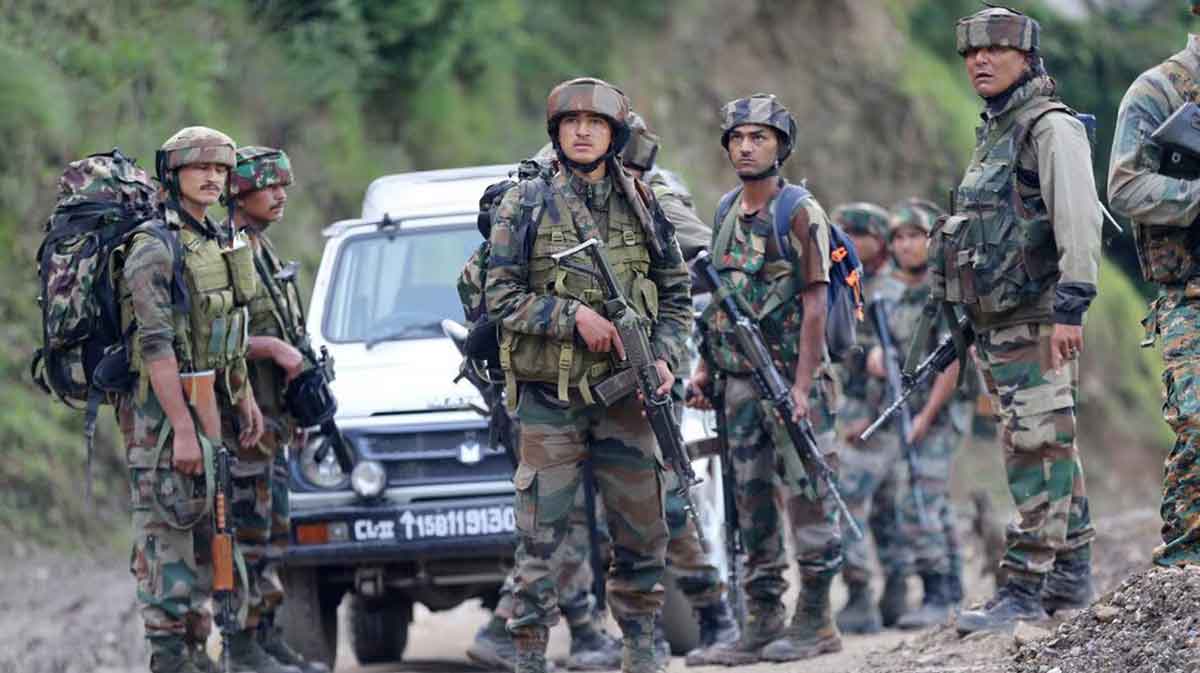Recent violence targets Army personnel, laborers, and civilians, raising concerns over growing instability
Ongoing Terror Strikes Leave Army Personnel Dead
In the past week, Jammu and Kashmir has been rocked by a series of terror attacks, culminating in the tragic death of two soldiers and two army porters on October 24. The attack occurred in the Gulmarg region, where terrorists ambushed an Indian Army patrol vehicle near the Line of Control (LoC). The vehicle, from the 18 Rashtriya Rifles (RR), came under fire in Butapathri, sparking a gunfight that claimed the lives of the four men. The porters, Mushtaq Ahmad and Zahoor Ahmad, were residents of Boniyar in Baramulla district. While no group has claimed responsibility, officials suspect Pakistan’s Border Action Team may be involved.
Jammu and Kashmir Chief Minister Omar Abdullah condemned the attack, calling it a “matter of serious concern” and extending his condolences to the victims’ families. Politicians across the political spectrum united in their outrage, with former CM Mehbooba Mufti and BJP president Ravinder Raina both denouncing the violence. Raina blamed Pakistan for attempting to destabilize the region, calling the attack a cowardly act carried out under the cover of darkness. Reinforcements have been deployed in the area as security forces continue to hunt for the attackers.
Teenager Shot in Tral: Escalating Targeted Attacks
The violence extended beyond military targets, with a separate attack on the same day in Jammu and Kashmir’s Tral area. Nineteen-year-old Shubham Kumar, a laborer from Uttar Pradesh, was shot by suspected terrorists in Batagund village, Pulwama district. Kumar sustained a bullet wound to his hand but is in stable condition after receiving medical care. Security forces cordoned off the area, though the attackers managed to evade capture.
Hurriyat leader Mirwaiz Umar Farooq condemned the attack, calling it “un-Islamic.” This pattern of targeted violence, especially against non-local workers, has raised alarms about the growing threat to the safety of civilians and outsiders in the region.
Deadliest Attack on Workers: Seven Killed in Sonamarg
The deadliest attack in the recent spate of violence occurred on October 20, when terrorists attacked a housing camp for laborers near the Sonamarg health resort. The terrorists, reportedly from The Resistance Front (TRF), an offshoot of Lashkar-e-Taiba, opened fire on workers at the camp belonging to APCO, the construction company building the Z-Morh tunnel on the Srinagar-Sonamarg highway. Among the seven people killed was a doctor from Kashmir who was dining with colleagues when the terrorists struck.
Footage from the attack shows two gunmen armed with an American-made M4 carbine and an AK-47 entering the camp, spending seven minutes executing the attack before fleeing. The attack, which specifically targeted non-local laborers, marked one of the most devastating assaults on civilians in the region in recent years.
The killings prompted strong reactions from across the nation. Home Minister Amit Shah condemned the attack, describing it as a “despicable act of cowardice.” He vowed that those responsible would face swift retaliation from security forces, and offered condolences to the families of the victims. The incident has underscored the vulnerability of migrant workers in Jammu and Kashmir, and sparked renewed concerns about the safety of laborers in conflict zones.
Pattern of Violence Aimed at Non-Local Workers
In addition to the Sonamarg massacre, the past week has seen a disturbing rise in attacks specifically targeting non-local laborers. These attacks appear to be part of a deliberate strategy by terrorists to instill fear among the migrant workforce, which plays a crucial role in the region’s development projects, including road infrastructure and tunnel construction. The violence has sparked an exodus of workers, further complicating efforts to bring economic stability and normalcy to the Union Territory.
Growing Concern Over Cross-Border Terrorism
While no single group has claimed responsibility for the recent attacks, officials believe that Pakistan-based terrorist outfits, aided by cross-border infiltrations, are likely behind the surge in violence. Groups such as Lashkar-e-Taiba and Jaish-e-Mohammed, known to operate with support from across the border, are suspected of being behind the recent attacks. Many believe that the Border Action Team (BAT), a special unit trained by the Pakistani military to carry out assaults along the LoC, could be involved in the attack on the army vehicle in Gulmarg.
The resurgence of violence in Jammu and Kashmir comes amid heightened tensions between India and Pakistan, with both nations accusing each other of fomenting unrest in the disputed territory. Pakistan’s repeated attempts to destabilize peace in the region, through both direct assaults and the backing of terrorist groups, has led to a precarious security situation.
Reinforcements and Security Measures
In response to the growing threat, Indian security forces have stepped up counter-terror operations across the Union Territory. Reinforcements have been rushed to high-risk areas, particularly near the LoC, as part of a broader strategy to prevent further cross-border infiltrations. Meanwhile, political leaders have called for calm and unity in the face of escalating violence, urging all parties to work together to restore peace in the region.
As the Union Territory grapples with these attacks, the government remains committed to neutralizing the terror threat and ensuring the safety of civilians and security personnel alike. Despite the ongoing challenges, the people of Jammu and Kashmir continue to display resilience in the face of terror, hopeful for a peaceful future.
(With inputs from agencies)





